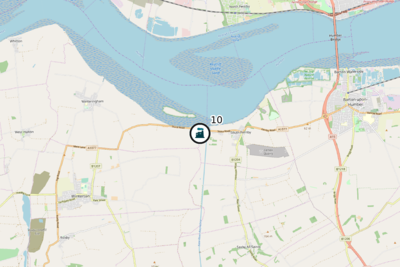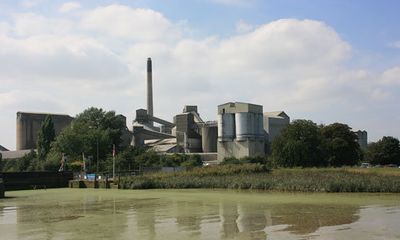South Ferriby Cement Kiln: Difference between revisions
No edit summary |
m change table order |
||
| Line 19: | Line 19: | ||
==Raw Materials== | ==Raw Materials== | ||
The primary raw materials are chalk and clay taken from different areas of the same adjacent quarry<ref>[http://www.cemexcommunities.co.uk/south-ferriby.aspx Cemex Community Matters PDF]</ref>. | The primary raw materials are chalk and clay taken from different areas of the same adjacent quarry<ref>[http://www.cemexcommunities.co.uk/south-ferriby.aspx Cemex Community Matters PDF]</ref>. | ||
{{NHLFTable|Permit=BL1029IP}} | |||
= | |||
{{EAIn|EPR=BL1029IP}} | {{EAIn|EPR=BL1029IP}} | ||
The proportion of the [[RDF]]/[[SRF]] tonnage used by [[Cemex]] is referred to by the company as [[Climafuel]]. | The proportion of the [[RDF]]/[[SRF]] tonnage used by [[Cemex]] is referred to by the company as [[Climafuel]]. | ||
==References== | ==References== | ||
<references /> | <references /> | ||
Revision as of 11:59, 20 May 2022
| South Ferriby Cement Kiln | |
 See Cement Kilns → page for a larger UK Wide map. | |
| Waste Licence | BL1029IP |
| Operator | Cemex |
| Parent Company | Cemex SAB de CV |
| Clinker Capacity | 0.75 Mt |
Summary site information collated from a variety of sources.

Overview
WikiWaste has used the website Cement Plants and Kilns in Britain and Ireland[1] extensively for the reference material for each individual cement kiln page. The detail on this reference website is extensive and as WikiWaste is focused upon the UK waste and resource market, only the key highlights are captured from this website (and company websites accordingly) to provide background and context. South Ferriby started manufacturing clinker in 1938 and up to 2015 had produced 25 million tonnes of clinker through 3 rotary kilns over this period.
Ownership
- 1938 to 1962 Eastwoods Ltd
- 1962 to 1979 Rugby Portland Cement Co. Ltd
- 1979 to 2000 Rugby Group
- 2000 to 2005 RMC
- 2005 to Present Cemex
The Process at South Ferriby
There are two kilns operating on the site, one supplied by Polysius and one by FLS (FLSmidth).
Raw Materials
The primary raw materials are chalk and clay taken from different areas of the same adjacent quarry[2].
Waste Tonnage, EWC List
The table shows a list of the Waste for the Permit BL1029IP, that has arrived into sites as reported to the Regulator and then publicised in their reported statistics. The Data used is the most current. The total reported tonnage arriving at the site was: Expression error: Unexpected < operator.t.
| EWC Code | Description | Tonnes In |
|---|
Waste Tonnage, By Origin
The table shows a list of the Waste for the Permit BL1029IP, that has arrived into sites as reported to the Regulator and then publicised in their reported statistics. The Data used is from the most recent returns. The total reported tonnage arriving at the site was: Expression error: Unexpected < operator.t.
Where this tonnage exceeds that reported in year of the corresponding annual report, this may be due to the following reasons:
- Tonnage may have been received but not incinerated, i.e. the material is held pending incineration (the operator return to the EA reports as received whereas the annual report focuses on when the waste is incinerated.)
- Material may have been received into the site but treated in some other way than incineration.
- Material may have been received on the but transferred out of site for disposal/treatment at another site rather than incineration on the site.
| EWC Code | Origin of Waste | Tonnes In |
|---|
The proportion of the RDF/SRF tonnage used by Cemex is referred to by the company as Climafuel.
